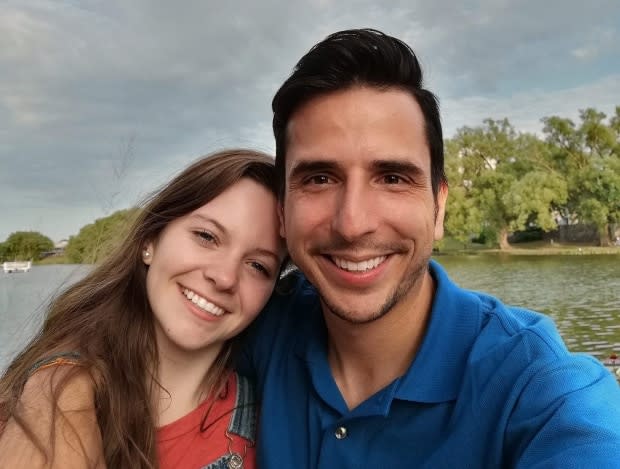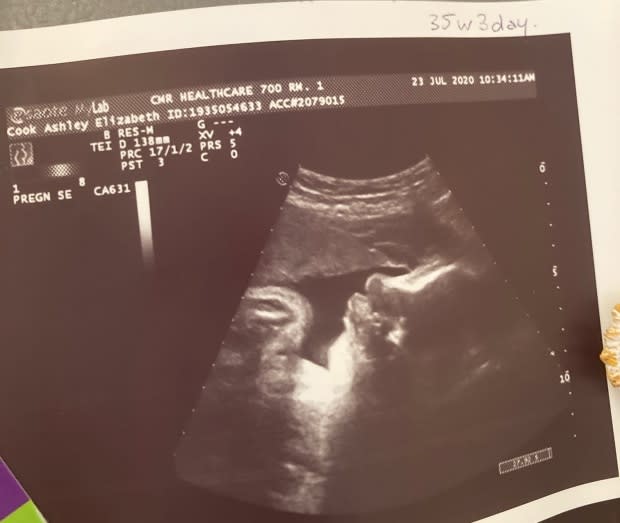These cross-border couples are considering drastic measures to be together
Thousands of couples across Canada are calling on the federal government to ease international travel restrictions to help them reunite after months apart.
Ottawa imposed the rules at the start of the pandemic shutdown in March, however, the border to Canada isn't entirely closed. Immediate family, including spouses and common-law partners, are allowed to pass through as long as they quarantine for 14 days when they return home.
But that doesn't include unmarried couples who don't fit the definition of common law. Travel restrictions also make it difficult for couples who work on either side of the border to cross back and forth.
Some couples are considering drastic steps to be together.
'I was devastated'

Living together under quarantine can be an effective litmus test for a couple.
It's how Monchai Chuaychoo and Amber Michiels really got to know each other.
They met just weeks before the pandemic shutdown. And after a few dates, Chuaychoo, who lives in Buffalo N.Y., gathered some of his belongings, and quarantined with Michiels and her five-year-old daughter in Cambridge, Ont.
But when Monchai went back to the United States in July for a doctor's appointment, he wasn't able to get back into Canada through the border in Buffalo.
"I was devastated," said Chuaychoo.
"It's hard on both of us, even more so, it's really hard on my daughter," said Michiels.

Chuaychoo says the border guard told him he wasn't considered immediate family, but that a marriage licence would change that.
Since Canadians can fly to the U.S., the couple has decided to take a flight to Las Vegas this weekend to tie the knot.
"It wasn't at all our intention to fly to Vegas and get married," said Michiels.
"We would have got married eventually, but not in the same way."
'I would be able to come back'

Omar Gutierrez and Christine Johnston have been apart since February.
But their story started the year before on the soccer field, when they were students at the University of Waterloo.
"Omar was a ref for a few of my games and I would argue with him a lot," said Johnston with a smile.
Gutierrez had been living in Canada for nearly a decade. When he finished a master's degree earlier this year, he went home to visit family in Mexico. Then the pandemic hit, and he wasn't able to get back into Canada.
Gutierrez says he has a job lined up in Kitchener, Ont., and has put a down payment on a home.

To get back to his life and love, he's considering some options. One possibility on the table is a loophole of sorts — applying for a work permit after travelling through the U.S.
His current application is on hold because the visa centre in Mexico has shut down during the pandemic.
"Normally I could apply for a work permit while I enter Canada. They put some emergency measures and so you're not able to do that unless you're coming from the U.S. and you've been in the U.S. for two weeks," said Gutierrez.
"So the option for me would be to go to the U.S. ... and be in airports and then be in a really high contagion zone and then go to Canada from there, which doesn't seem like a very smart thing," said Gutierrez.
"And yet if I did that, I would be able to come back."
'It's just heartbreaking'

Ashley and Tom Cook are preparing to welcome a new member of their family in less than a week.
"I feel like we're failing as parents from the get go. Like we're bringing a child into this world and we aren't even able to be there for her," said Ashley.
"And it's just heartbreaking."
The couple are married, but they work as physicians on either side of the border. Ashley in Windsor, Ont., and Tom in Petoskey, Mich., — his home state.

Tom has used up all his vacation time with the 14-day quarantine requirement. He has to do that every time he crosses the border to get home to Ashley.
So it's unclear how he'll be able to see his wife and newborn once he goes back to work in the U.S.
"I'm not going to be able to get to see my baby after the first five or six days that she's here," said Tom.
The couple is frustrated they haven't heard much from the federal government in response to the pleas of cross-border couples.
"We're not getting any answers," said Ashley.
'These are difficult situations'
The Canada Border Services Agency declined an interview, but in a statement said the current travel restrictions are in place to protect residents of Canada.
"We recognize that these are difficult situations for some, however these are unprecedented times, and the measures imposed were done so in light of potential public health risks," said a statement from spokesperson Rebecca Purdy.
CBC News also requested an interview with the Ministry of Public Safety Bill Blair, but the department said it would not comment beyond the CBSA statement.
The federal government has set next Friday as the border reopening date, but none of the couples CBC News spoke to are holding their breath.
Experts say it's likely the date will be pushed back again and that the border probably won't reopen until 2021.

